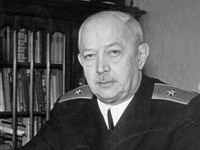The ocean of life of Nikolai Zubov
Among the founders of the State Oceanographic Institute, the first place belongs to Nikolai Zubov - Doctor of Geographical Sciences, Professor, Rear Admiral, Honored Scientist of the RSFSR. How did the son of a czarist officer, a former lieutenant colonel of Kolchak's Army manage to achieve such success in Soviet times?

His fate is truly amazing. It is hard to imagine that a man with such a "dubious" origin and "non-proletarian" past could achieve enormous success in the USSR ... But the fact remains a fact: in the Soviet Union, Nikolai Zubov achieved success in research activities and was admitted to the holy of holies - the organization of scientific work.
Nikolai Zubov was born in 1885 in the town of Lipkany, the Khotyn district of Bessarabia, into a family of an officer. His father was a staff-captain of Astrakhan Dragoons, Nikolai Zubov, a professional soldier, a cavalry officer, who had distinguished himself in the battles of the Russian-Turkish War of 1877-1878. He belonged to the category of so-called service class men, who lived only on their salaries. Afterwards, he was promoted to major general. His mother was a housewife: the family had ten brothers and sisters.
Nikolai Zubov received primary education in St. Petersburg, where he graduated from high school and a military school. At 16, he became a pupil of the prestigious Naval Cadet Corps. At 19, Nikolai Zubov became a naval midshipman. His graduation came early: the Russian-Japanese War began. He was assigned to the squadron of Admiral Rozhdestvensky. As a warrant officer on Brilliant destroyer, he participated in the Battle of Tsushima. He was wounded; the recovery took a lot of time.
The First World War broke out. In October 1914, Nikolai Zubov was the commander of Poslushny (Obedient) destroyer. Afterwards, he served at the headquarters of the Baltic Fleet. In October 1915, the Cayman submarine, on which Lieutenant Zubov was then serving, captured a German ship.
The tragic maelstrom of the revolution and the Civil War removed Nikolai Zubov from maritime affairs for a long time. He was called to the White Army of Kolchak, where he served as a lieutenant colonel. The events of that time subsequently led to the darkest pages in his biography. In 1924, Zubov was exiled to the town of Cherdyn, the Northern Urals, from where he returned only in four years. Immediately afterwards, he was employed at ocean sciences to explore the Arctic. In 1930, he was arrested on the sensational case of the Industrial Party.
It turned out, though, that Nikolai Zubov was indispensable. The country had no other specialists with such high scientific and organizational experience. Already in 1931, Nikolai Zubov was appointed the scientific secretary of the Soviet National Committee for the Second International Polar Year. It was Zubov who insisted on including an extensive complex of oceanographic operations in polar waters in the program of the International Polar Year.
In 1932, on board a small motor sailing boat "Nikolai Knipovich," Zubov skirted the north of Franz Josef Land archipelago for the first time in the history of Arctic navigation. This was, perhaps, the most glorious page in the polar research of the early 1930s.
In 1935, Zubov became the supervisor of the famous high-latitude mission on the Sadko icebreaker. In this trip, the Sadko reached a record latitude in free sail; there were unique collections of marine organisms, sediments and water samples collected. In 1937, Nikolai Zubov received the degree of Doctor of Geographical Sciences without defending a thesis.
With the beginning of the Great Patriotic War, he filed a report with a request to call him to the fleet as a professional navy sailor. Captain of the II rank Zubov was appointed the Chief of Staff of the icebreaking detachment of the White Sea Flotilla. With his knowledge of the Arctic, he could predict the time of freeze-up and break-up, he directed ice crossings across the Northern Dvina. He finished the war as a first rank captain.
In 1944, when the war was still on, Nikolai Zubov was appointed the chief of the State Oceanographic Institute (SOI). He had to "build" the institute virtually from scratch. The new chief received a new building for the institute in Kropotkinsky Side Street, where the institute is still located today. The head of the SOI was strict, principled and uncompromising when it came to scientific debate. He enjoyed absolute authority of a scientific leader among the staff.
In 1947, a major monograph of the scientist "Dynamic Oceanography" saw the light, which became an indispensable textbook for oceanographers for many years. In 1948, when the SOI recovered feet, Zubov resigned and decided to devote himself to research and teaching at the Moscow State University. The list of papers published by him afterwards, takes 12 pages of printed text. Indeed, his contribution to ocean science is invaluable ...
Nikolai Zubov died on November 11, 1960 and was buried at Novodevichy Cemetery in Moscow. Two ships were named in memory of the scientist: expeditionary oceanographic ship "Nikolai Zubov" of the Naval Hydrographic Service and the research vessel "Professor Zubov" of the Arctic and Antarctic Institute.
The name of Nikolai Zubov is marked on the geographical map too: Cape Zubov on Novaya Zemlya and the Bay of Nikolai Zubov in the Antarctic. The State Oceanographic Institute is also named after Nikolai Zubov.
Andrey Mikhailov
Pravda.Ru
Subscribe to Pravda.Ru Telegram channel, Facebook, RSS!


